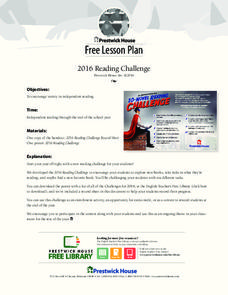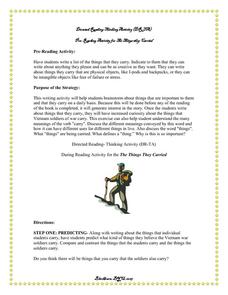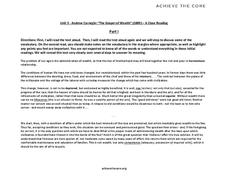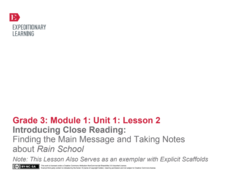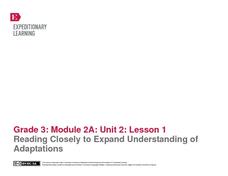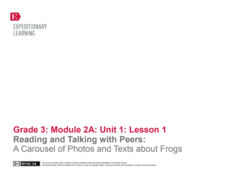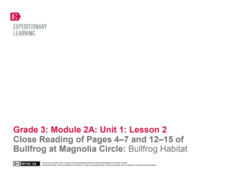EngageNY
Developing Reading Fluency: Beginning the End of Unit 2 Assessment
Third graders continue to develop their reading fluency in preparation for their assessment in the tenth lesson plan of this unit. Young readers are provided with a short passage on Helen Keller, which they use while working in pairs...
Urban Ministry
Interactive Read Aloud
Learning how to deliver good literacy instruction is key to becoming a successful teacher. This resource isn't so much a lesson as it is a guide to leading children in an interactive read-aloud session to increase fluency, comprehension,...
Prestwick House
Reading Challenge
One of the big challenges of assigning independent reading is helping class members find a book to read. Another is encouraging readers to read a variety of genres. Never fear, help is here in the form of a quest that asks individuals to...
Curated OER
Using the Comprehension Strategies
High school learners review the six major reading comprehension strategies. They demonstrate the strategies by putting them into action using more complex reading. They finish by discussing a seventh strategy, monitoring comprehension.
Novelinks
Nightjohn: List-Group-Label Strategy
Encourage readers of Nightjohn, Gary Paulsen's young adult novel about slavery set shortly before the Civil War, to develop their categorization and organizational skills with a strategy that asks them to list all the words they can...
Curated OER
8th Grade Reading Comprehension Success
Augment your eighth grade language arts curriculum with a thorough set of reading comprehension activities and assessments. Focusing on a variety of skills, including vocabulary in context, text structure, main idea, and author's style,...
Novelinks
The Heart Is a Lonely Hunter: Vocabulary List
A staggering amount of work went into compiling this vocabulary resource for Carson McCullers' The Heart Is a Lonely Hunter. The overview provides a rationale for the strategy and information about tier 1, 2, and 3 words. The 19-page...
Heritage Foundation
How to Read the Constitution
Even lawyers can find the US Constitution to be very wordy! Help learners create a foundation for understanding the Constitution with several analysis essays. Multiple activities complement the reading and allow for active and meaningful...
ReadWriteThink
Sonic Patterns: Exploring Poetic Techniques Through Close Reading
Robert Hayden's poem "Those Winter Sundays" serves as the anchor text in a five-part lesson plan that takes the mystery out of poetry analysis by modeling explicit strategies for pupils to employ to conduct a close reading of a poem....
Curated OER
Bucket List Poetry
What is on your pupils' "Bucket Lists" - the list of things they want to do before they die? Their choices of activities for this list could be very revealing, and is a great source of inspiration for a personal poem. The lesson prompts...
Curated OER
It's All About Expression: Growing Independence and Fluency
In an engaging anticipatory set, the teacher uses several different strategies to activate prior knowledge about reading with expression, including using sentence strips (that must be prepped ahead of time) to show different moods. The...
Center for Open Educational Resources and Language Learning
Reading Activity
Ready to integrate technology into your ELL instruction? Check out this reading lesson that has language learners using the Internet and apps, joining online book clubs, and creating blogs. A fine model of what can be done.
Curated OER
Guided Reading with Elizabeti's Doll
Practice reading strategies using Elizabeti's Doll by Stephanie Stuve-Bodeen. Readers utilize decoding and comprehension strategies before, during, and after reading the story. A detailed list of text features, high frequency words,...
Curated OER
The Things they Carried: Directed Reading Thinking Activity
To generate interest in and enable readers to connect to The Things They Carried, class members write about what they carry—both tangible and intangible things. The class then makes a list of these things and compares the list to...
Curated OER
The Gospel of Wealth by Andrew Carnegie: A Close Reading
Andrew Carnegie's "The Gospel of Wealth" provides high schoolers an opportunity to engage more complex text. After a close reading of the essay and an analysis of Carnegie's argument that the rich are superior because they earn money,...
EngageNY
Reading for Gist: “Middle Ages” Excerpt 1
Dig deep. Scholars dig deep for meaning while reading Middle Ages Excerpt 1. They begin by finding unfamiliar words and adding them to a word catcher. Pupils then take a close look at adversity in the text and complete an anchor chart.
Curated OER
Reading With Fluency And Expression
Practice makes perfect, and this lesson provides a rubric to prove it! To improve their ability to read with fluency and expression, readers listen to a series of online stories in order to hear how a well-read story should sound. They...
EngageNY
Introducing Close Reading: Finding the Main Message and Taking Notes About Rain School
This second lesson in a larger unit is perfect for the beginning of the year because it explicitly teaches 3rd graders how to use close reading skills by identifying unfamiliar words, figuring out the gist, and defining important...
EngageNY
Reading Closely to Expand Understanding of Adaptations
Third graders work to determine the main idea, recall key details, and answer questions using an informational text on the topic of animal adaptations. Using the non-fiction text "Staying Alive: Animal Adaptations" (provided) the teacher...
EngageNY
Close Reading of Bullfrog at Magnolia Circle: Main Ideas about the Bullfrog
As your class reaches the end of the book Bullfrog at Magnolia Circle, the seventh lesson in this literary unit helps third graders transition from reading narrative to expository writing. Scholars develop their note-taking skills as...
EngageNY
Mid-Unit Assessment: Close Reading of Bullfrog at Magnolia Circle: Bullfrog Life Cycle
The sixth lesson plan in this Bullfrog at Magnolia Circle unit assesses your third graders' ability to read and understand informational text. The included assessment asks learners to take notes about the main idea and supporting details...
EngageNY
Reading and Talking with Peers: A Carousel of Photos and Texts about Frogs
Frogs are the theme of a lesson plan that challenges scholars to examine photographs, read informational texts, then ask and answer questions. Scholars work collaboratelively as they rotate through stations, discuss their observations,...
EngageNY
Close Reading of Pages 4 - 7 and 12 - 15 of Bullfrog at Magnolia Circle: Bullfrog Circle
Scholars take part in a close reading of pages four through seven and 12-15 of the book, Bullfrog at Magnolia Circle: Bullfrog Circle by Deborah Dennard. Readers identify the story's main idea, list its key details, and examine...
EngageNY
Reading for Gist, Answering Text-Dependent Questions, and Determining Author’s Purpose: Industrial Food Chain
A Reading Closely: Guiding Questions handout leads readers to discover the gist of The Omnivore’s Dilemma. While reading, pupils look closely at the words in the text and discuss their meaning. They use dictionaries when needed to answer...
Other popular searches
- List of Reading Genres
- Reading and Listening
- Reading List of Words
- Middle School Reading List
- Fifth Grade Reading List
- Choral Reading List
- Short Story Reading List
- Guided Reading Check List
- Supplemental Reading List
- Summer Reading Lists
- 6th Grade Reading List
- American Poetry Reading List




